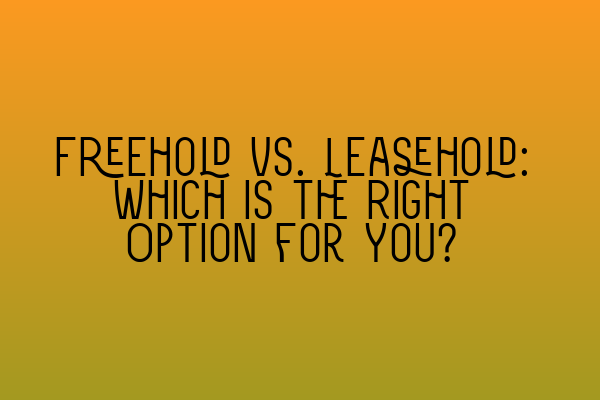Freehold vs. Leasehold: Which is the Right Option for You?
When it comes to buying property, one of the most important decisions you’ll need to make is whether to opt for a freehold or leasehold ownership. Freehold and leasehold are the two main types of property ownership in the UK, each with its own unique advantages and considerations. In this article, we will delve into the differences between these two options to help you make an informed decision that suits your needs and preferences.
What is Freehold?
In simple terms, freehold ownership means that you own both the property and the land it sits on outright. You have complete control and autonomy over your property, making all decisions regarding maintenance, renovations, and land use. Freehold properties are considered the most traditional form of property ownership and are typically houses or bungalows rather than flats or apartments.
Benefits of Freehold Ownership
There are several advantages to owning a freehold property. Firstly, you don’t have to worry about paying ground rent or service charges, which are common in leasehold properties. This can save you money in the long run, as these additional costs can add up over time. Additionally, with freehold ownership, you are not subject to the terms and conditions of a lease, providing you with more flexibility and freedom.
Furthermore, freehold properties tend to be more appealing to potential buyers, making them easier to sell in the future. The sense of ownership and autonomy that comes with freehold ownership often appeals to individuals looking for long-term investment opportunities.
What is Leasehold?
Leasehold ownership, on the other hand, means that you own the property for a set period of time, as stipulated in the lease agreement with the freeholder. Leasehold ownership is more common in flats and apartments, where multiple units share common spaces and facilities. The freeholder retains ownership of the land and the building, while the leaseholder has the right to occupy the property for the agreed-upon lease term.
Benefits of Leasehold Ownership
Although leasehold ownership may come with some additional costs and restrictions, it does offer certain advantages. For instance, leasehold properties often come with added amenities such as communal gardens, parking spaces, or security services, which can enhance your living experience. Additionally, the responsibility for major repairs and maintenance of the building typically falls on the freeholder, relieving you of some financial and logistical burdens.
Leasehold properties also provide a sense of community, as you share common spaces with other residents. If you prefer the convenience of shared amenities and a tighter-knit community, leasehold ownership may be the right option for you.
Considerations for Choosing Between Freehold and Leasehold
When deciding between freehold and leasehold ownership, there are several factors to consider:
1. Budget: Freehold properties may initially be more expensive, but leasehold properties often come with additional costs such as ground rent, service charges, and maintenance fees. Evaluate your financial situation and determine what you can afford in the long run.
2. Future Plans: If you envision making significant changes or extensions to the property, freehold ownership provides more flexibility and fewer restrictions. Leasehold properties may require permission from the freeholder and can come with restrictions on alterations.
3. Length of Lease: If you are considering a leasehold property, carefully review the terms of the lease including the remaining lease term, ground rent increases, and any restrictions on subletting or alterations. Ensure the length of the lease aligns with your long-term plans and financial goals.
4. Resale Value: Freehold properties generally have a higher resale value due to the appeal of full ownership. If you anticipate selling the property in the future, a freehold property may offer more potential for capital appreciation.
5. Future Developments: If you are considering a leasehold property, investigate any potential future developments or changes in the area. For example, if the freeholder plans to build additional units that could obstruct your views or affect your enjoyment of the property, it’s essential to be aware of these factors before making a decision.
Conclusion
Ultimately, the choice between freehold and leasehold ownership depends on your personal circumstances, preferences, and long-term plans. Freehold ownership grants greater autonomy and financial independence, while leasehold ownership can provide convenient amenities and a sense of community. Consider your budget, future plans, and the specific terms and conditions associated with each option before making a decision.
To further expand your knowledge of property law and prepare for the SQE exams, consider exploring our related articles and resources:
– SQE 1 Practice Exam Questions: Test your knowledge and familiarize yourself with the format of the SQE 1 exam by practicing with our comprehensive question bank.
– SQE 1 Practice Mocks FLK1 FLK2: Prepare for the SQE 1 exam with our mock exams, designed to simulate the actual exam experience and assess your readiness.
– SQE 2 Preparation Courses: Enhance your understanding of property law and other key subjects with our SQE 2 preparation courses, tailored to help you succeed in the exam.
– SQE 1 Preparation Courses: Build a solid foundation in property law and other essential legal topics through our SQE 1 preparation courses, designed to support your exam success.
– SRA SQE Exam Dates: Stay up to date with the latest SQE exam dates and deadlines to effectively plan your study schedule and exam preparations.
At SQE Property Law & Land Law, we are here to guide you through the complexities of property ownership and provide comprehensive support in your quest to become a qualified solicitor. Contact us today to learn more about our services and how we can assist you on your legal journey.
*Note: This blog post is for informational purposes only and should not be construed as legal advice. Always consult with a qualified solicitor or legal professional for specific advice related to your individual situation.
